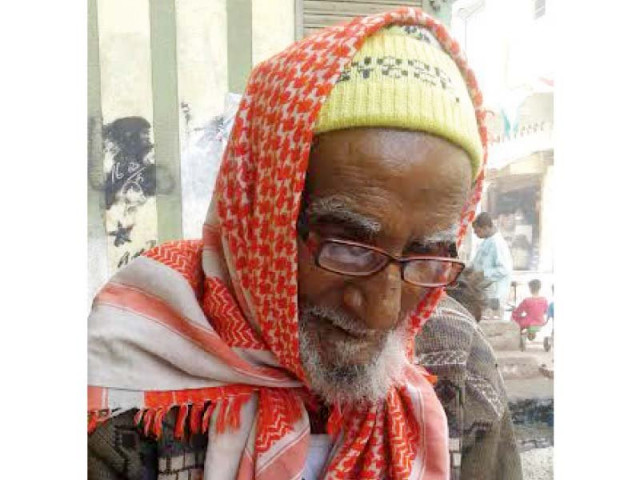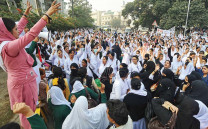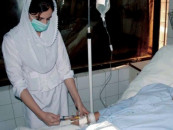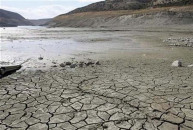The man who lived in three centuries
Doshambe Haider grew up with Karachi,and has seen its transition from a colonial city to today's bustling...

Doshambe Haider, 112, grew up in Karachi as the city grew. He has seen Karachi’s transition from a medium-sized colonial city to one of the largest metropolitans in the world. PHOTO: EXPRESS
Haider belongs to the generation that saw Karachi's transition from a medium-sized colonial city to one of the largest metropolitans in the world. He is witness to events of the British colonial era as well as the struggle for its identity post-independence. He also remembers vividly the day the US dropped atomic bombs on Hiroshima and Nagasaki, Japan.
A common man’s obituary: The saviour of Chawkandi tombs
Age is but a number
"I am 112 years old," he told The Express Tribune during an interview last month. His peers claim he is much older. "I was the eldest one. My sisters and brother died long ago. I don't see anyone my age anymore," he said, smiling. He has six daughters and three sons from three wives, but does not really remember the number of his grandchildren. Haider has lived in Shah Baig Lane, Lyari since childhood.
"I don't remember everything but can recount major events," he said. "I remember Quaid-e-Azam's funeral as well as Liaquat Ali Khan's." He didn't meet the founder of the country but remembers shaking hands with the country's first prime minister in Jahangir Park, Saddar.
Time of Partition
Haider was in Bombay, India, when the Second World War was at its peak. "Only Hindus, Sindhis and Baloch were in Karachi before partition," he says, adding that he helped various families leaving Karachi for India from the city's railway station. "They were very nice people and had good houses in Kharadar and Bandar Road [now MA Jinnah Road]."
Haider is one of the few people who still remember the time of the coal engines. "Karachi's roads were not made with bitumen before partition." There were few markets in Karachi such as the one in Saddar, Khajoor Bazaar and Jodia Bazaar. The city wasn't as populous back then either, he says with a dazed look.
World's oldest man dies at 112 in Japan
Fond memories
"I saw countless [Muslim] families who migrated from India. It feels like it all happened yesterday." The elderly man remembers English men playing football at the Sindh Madressatul Islam's ground every evening. "Lyari was famous for football even at that time," he recalls, adding that young boys from Lyari used to play with the British players.
Zulfikar Ali Bhutto visited Lyari often, says Haider.
He met the leader several times at Aath Chowk, Moosa Lane and other areas and even offered to carry him across a dirt patch once. "It was raining," he reminisces, with a twinkle in his eyes. "But he preferred to cross the muddy road and entered into the streets."
Having spent his life as a labourer, Haider claims to have taken part in the construction of two airports of the port city: Jinnah International Airport and the Pakistan Air Force base at Mauripur.
The elders' club
Wearing a Keffiyeh [Palestinian scarf] around his neck to cover his ears from the cold, Haider laments at the lack of good company to share his memories with. "People don't have time for their elders," he says, his hands shivering.
He hardly sleeps for a few hours in the night. He leaves home early in the morning to sit outside the Lyari Students Club where several elderly persons of the area gather daily.
Taj Mohammad, 87, Mohammad Usman, 85, and others enjoy their daily sojourns with Haider. "I am a retired government official who likes spending time with these friends," says Taj. The 87-year-old laments that the younger generation doesn't like spending time with the elderly.
Exploring Sindh: King of the road
"Haider is over 120 years old," claims Taj, adding that, "He is still healthier than most of us and can hear and see much better than others a lot younger than him." Their friend, Usman, nods in agreement. Haider's national identity card went missing several months ago. "I also lost my money with the card," he informs sadly, claiming that he has no copy of it either. The family members visited the NADRA office to get a new one made but were refused.
"The officials say they don't issue documents to any person older than 60," explained Sabeer Ahmed, a social activist. "Our elders are sadly being ignored," he lamented further.
Published in The Express Tribune, January 23rd, 2016.


















COMMENTS
Comments are moderated and generally will be posted if they are on-topic and not abusive.
For more information, please see our Comments FAQ